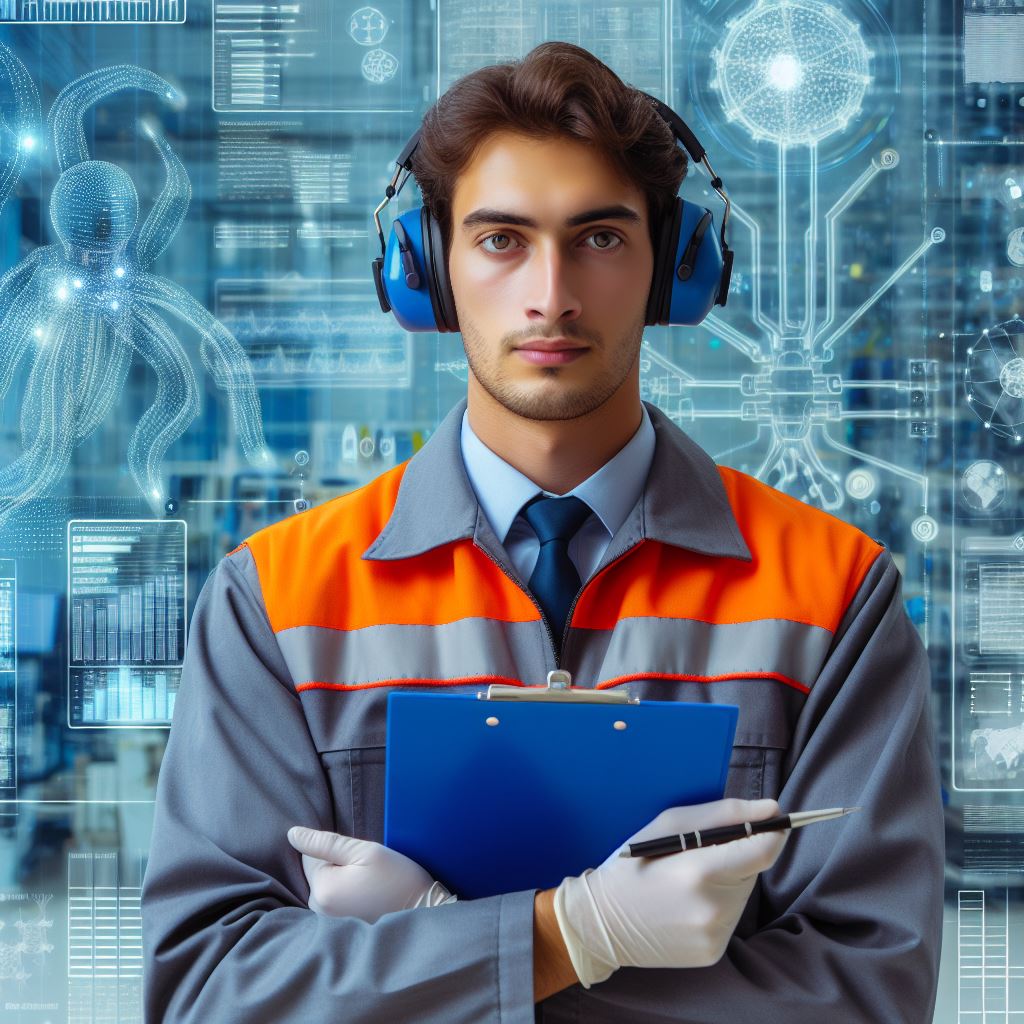Introduction
Demand for emerging tech fields in Australia
The demand for emerging tech fields in Australia is rapidly growing, creating new opportunities for technicians.
These technicians play a crucial role in these fields, ensuring smooth operations and technological advancements.
This blog post aims to highlight the significance of technicians in emerging tech fields in Australia and provide insights into the purpose of this discussion.
As technology continues to advance at an unprecedented pace, Australia is witnessing a surge in demand for professionals in emerging tech fields.
From artificial intelligence to cybersecurity, these fields are expanding rapidly, creating a need for competent technicians.
Importance of technicians in these fields
Technicians hold a vital position in emerging tech fields, as they are responsible for implementing and maintaining the technology infrastructure.
They play a crucial role in troubleshooting and resolving complex technical issues, ensuring the smooth functioning of various systems and processes.
Purpose of the blog post
The purpose of this blog post is to emphasize the significance of technicians in emerging tech fields in Australia.
It aims to shed light on the growing demand for their expertise and the indispensable role they play in driving innovation and technological progress.
With the increasing reliance on technology in various sectors, technicians are becoming indispensable for organizations to stay competitive and adapt to the rapidly changing technological landscape.
Their skills and knowledge are crucial for the successful implementation and utilization of emerging technologies.
In the following sections, we will explore different emerging tech fields and delve into the specific roles and responsibilities of technicians in each of these areas.
Stay tuned to discover the exciting opportunities awaiting Australian technicians in emerging tech fields.
Emerging tech fields in Australia offer a variety of exciting opportunities for technicians. These fields are experiencing rapid growth and innovation, creating a demand for skilled professionals.
Technicians play a significant role in these industries, contributing to their success and development.
Overview of Emerging Tech Fields
Mention the variety of emerging tech fields in Australia
- Artificial Intelligence (AI): AI is revolutionizing various industries, including healthcare, finance, and manufacturing.
- Internet of Things (IoT): IoT connects devices and objects, enabling seamless communication in sectors like agriculture, transportation, and smart cities.
- Blockchain Technology: Blockchain has the potential to transform sectors like finance, supply chain management, and digital identity verification.
- Cybersecurity: With the continuous growth of cyber threats, the demand for cybersecurity professionals is skyrocketing.
- Robotics: The field of robotics is expanding rapidly, with applications in industries such as healthcare, agriculture, and logistics.
- Data Science: Data scientists are in high demand to analyze and derive insights from the vast amount of data generated by businesses.
Disclose the potential career opportunities in these fields:
Emerging tech fields offer a wide range of career opportunities. Professionals can pursue various roles, including
- AI Specialist: Developing AI algorithms and systems to solve complex problems.
- IOT Engineer: Designing and implementing IoT solutions for different sectors.
- Blockchain Developer: Building secure and decentralized applications using blockchain technology.
- Cybersecurity Analyst: Protecting networks, systems, and data from cyber threats.
- Robotics Engineer: Designing and building robots for specific applications.
- Data Scientist: Analyzing data to identify patterns, trends, and insights to drive business growth.
The significance of technicians in these industries:
Technicians play a vital role in emerging tech fields by providing technical support, troubleshooting, and maintenance.
They bridge the gap between theory and practical implementation, ensuring smooth operation of systems and equipment.
Technicians in AI fields assist in the development and implementation of AI systems. They work closely with AI specialists and engineers to ensure the seamless functioning of AI algorithms and models.
In IoT, technicians help in the installation, configuration, and maintenance of IoT devices. They play a crucial role in troubleshooting and resolving connectivity issues, ensuring efficient communication between devices.
Blockchain technicians support developers by deploying and managing blockchain networks. They are responsible for maintaining network security and resolving any technical issues that arise.
Cybersecurity technicians assist in monitoring and maintaining the security infrastructure of organizations.
They conduct regular audits, implement security measures, and respond to cybersecurity incidents to protect valuable data from breaches.
Technicians in robotics fields contribute to the design, assembly, and maintenance of robots.
They work alongside engineers to ensure robots function optimally, perform necessary repairs, and troubleshoot any problems that may arise.
Data science technicians support data scientists in data acquisition, cleaning, and preprocessing.
They help maintain data infrastructure, perform data analysis, and assist in the development of machine learning models.
Your Personalized Career Strategy
Unlock your potential with tailored career consulting. Get clear, actionable steps designed for your success. Start now!
Get StartedIn general, emerging tech fields in Australia offer exciting career opportunities for technicians. These fields are growing rapidly, creating a demand for skilled professionals.
Technicians play a crucial role in these industries, ensuring smooth operation and innovation in various technological advancements.
Artificial Intelligence and Machine Learning
Artificial Intelligence (AI) and Machine Learning (ML) have revolutionized various industries in recent years.
These emerging technologies have opened up new opportunities for technicians to contribute to groundbreaking projects.
In this section, we will explore the role of technicians in AI and ML projects, discuss the applications and impact of these technologies in various industries, and highlight the skills and qualifications required to work in this field.
The Role of Technicians in AI and ML Projects
- Technicians play a crucial role in AI and ML projects by implementing and maintaining the underlying infrastructure.
- They are responsible for setting up the hardware, software, and networking components required for data processing and analysis.
- Technicians also assist in data collection, cleaning, and preparation, ensuring that the input data is suitable for AI and ML algorithms.
- They collaborate with data scientists and engineers to deploy machine learning models and fine-tune them for optimal performance.
- Furthermore, technicians are involved in monitoring and troubleshooting AI systems, addressing technical issues and ensuring smooth operations.
Applications and Impact of AI and ML in Various Industries
The applications of AI and ML are wide-ranging across different industries, and their impact is transformative.
Healthcare Industry
- AI and ML help in diagnosing diseases more accurately and quickly, leading to improved patient outcomes.
- They enable the analysis of extensive medical data, providing personalized treatment plans and preventive measures.
- AI-powered robots and virtual assistants assist in repetitive tasks, freeing up healthcare professionals’ time.
Finance Industry
- AI and ML algorithms analyze financial data to detect fraudulent activities and prevent financial crime.
- They enable personalized financial recommendations and investment predictions based on historical data.
- AI-powered chatbots provide customer support and assist in automated trading.
Transportation Industry
- AI and ML optimize traffic management, reducing congestion and improving transportation efficiency.
- They enable self-driving cars, enhancing safety and offering a more convenient driving experience.
- AI systems analyze sensor data to predict maintenance needs, ensuring proactive vehicle servicing.
Skills and Qualifications Required to Work in this Field
To excel in the field of AI and ML as a technician, certain skills and qualifications are essential.
- Proficiency in programming languages like Python, R, or Java for implementing AI and ML solutions.
- Strong understanding of statistics, linear algebra, and calculus to comprehend and develop complex algorithms.
- Knowledge of data processing frameworks such as TensorFlow, PyTorch, or Apache Spark.
- Experience in working with cloud platforms and distributed computing systems for scalability.
- Ability to analyze and interpret data, providing insights and making data-driven decisions.
- Continuous learning and staying updated with the latest advancements in AI and ML technologies.
Therefore, technicians play a vital role in AI and ML projects, ensuring the smooth implementation and maintenance of these technologies.
The applications of AI and ML have far-reaching effects on industries such as healthcare, finance, and transportation.
To work in this field, individuals need to acquire a combination of technical skills and qualifications to contribute effectively to the development and deployment of AI and ML solutions.
Read: Challenges Faced by Modern Architects
Internet of Things (IoT)
Exploring the Internet of Things (IoT)
The Internet of Things (IoT) is a revolutionary concept that has transformed the way we live and work in today’s fast-paced world.
It refers to the interconnection of everyday objects through the internet, enabling them to send and receive data, communicate, and perform tasks without human intervention.
The concept of IoT and its significance in today’s world
The significance of IoT cannot be understated. It has opened up a plethora of opportunities for businesses, governments, and individuals to harness the power of technology and drive innovation.
With IoT, devices and systems can collect and analyze data, automate processes, and improve efficiency in various industries.
Role of technicians in building and maintaining IoT systems
Technicians play a crucial role in building and maintaining IoT systems. They are the backbone of this digital infrastructure, ensuring that devices are properly installed, connected, and functioning optimally.
Technicians are responsible for troubleshooting issues, conducting repairs, and keeping the IoT network up and running smoothly.
Examples of industries where IoT is extensively used and the career prospects for technicians
The healthcare industry extensively uses IoT for remote patient monitoring, vital sign tracking, and real-time alerts.
Technicians ensure proper IoT device functioning.
In transportation, connected vehicles enable performance monitoring, maintenance identification, and breakdown prediction for proactive maintenance and road safety.
IoT has entered agriculture with smart farming techniques relying on devices for data collection on soil, weather, and crop health.
Technicians in agriculture ensure proper installation and calibration of IoT devices, improving crop yields and resource management.
Skilled IoT technicians are highly sought after as industries adopt IoT for design, implementation, and maintenance.
Job opportunities exist in manufacturing, energy, smart cities, and home automation.
IoT-specialized technicians find roles as network administrators, system integrators, and IoT solution architects in technology companies, consulting firms, or directly with integrating organizations.
The Internet of Things (IoT) revolutionizes industries, offering endless opportunities for technicians from healthcare to transportation and agriculture.
Technicians must keep pace with emerging technologies for success in the evolving digital landscape.
Read: Historic Preservation in Australian Architecture

Explore Further: Key Skills for Mechanical Engineers in 2024
Augmented Reality and Virtual Reality (AR/VR)
Augmented Reality (AR) and Virtual Reality (VR) are emerging technologies that are revolutionizing various industries.
AR refers to the integration of digital information with the user’s real-world environment, while VR immerses users in a completely simulated world.
Let’s delve into the applications of AR and VR in different sectors and the role of technicians in developing AR/VR experiences.
Applications of AR/VR in Different Sectors
- In the healthcare sector, AR/VR can be used for training medical professionals, simulating surgical procedures, and enhancing patient care through virtual therapy.
- Education is another field where AR/VR can play a vital role by creating immersive learning experiences, making complex subjects more understandable and engaging.
- The entertainment industry has embraced AR/VR for creating realistic and immersive gaming experiences and enhancing movie-watching experiences.
- In architecture and design, AR/VR can assist in creating virtual walkthroughs, allowing clients to experience and modify designs before implementation.
- Industrial sectors can utilize AR/VR for training employees in hazardous or complex work environments, reducing risks and increasing efficiency.
The Role of Technicians in Developing AR/VR Experiences
Technicians play a crucial role in the development and implementation of AR/VR experiences. They are responsible for
Stand Out with a Resume That Gets Results
Your career is worth more than a generic template. Let us craft a resume and cover letter that showcase your unique strengths and help you secure that dream job.
Get Hired- Designing and creating realistic virtual environments, objects, and characters.
- Developing interactive user interfaces to enhance the user experience.
- Integrating software and hardware components to ensure smooth functioning.
- Testing and troubleshooting AR/VR systems to identify and resolve technical issues.
- Collaborating with other professionals, such as programmers and designers, to bring ideas to life.
Skills and Qualifications Necessary for Working in the AR/VR Field
Working in the AR/VR field requires a combination of technical skills and qualifications
- Proficiency in programming languages such as C++, C#, or Unity, as these are used for creating AR/VR applications.
- Strong knowledge of 3D modeling and animation software like Blender or Maya to develop virtual environments and objects.
- Understanding of human-computer interaction and user experience design principles to create intuitive interfaces.
- Knowledge of computer graphics and algorithms that contribute to creating realistic simulations.
- A degree or certification in computer science, game development, or a related field is highly desirable.
Moreover, individuals in this field should possess creativity, problem-solving skills, and a passion for pushing the boundaries of technology.
Essence, AR/VR technologies have the potential to transform various sectors and provide immersive experiences to users.
Technicians play a significant role in developing these experiences, requiring a blend of technical skills and qualifications.
As AR/VR continue to advance, more opportunities will arise for Aussie technicians to contribute to these cutting-edge fields.
Read: Surveying 101: An Aussie’s Intro to the Field
Gain More Insights: Top Skills Needed for Technical Technicians
Cybersecurity
Importance of cybersecurity in today’s digital landscape
In today’s digital landscape, cybersecurity has become increasingly important to protect systems and networks from cyber threats.
Role of technicians in ensuring the security of systems and networks
Technicians play a crucial role in ensuring the security of these systems and networks.
They are responsible for implementing security measures, monitoring for any breaches or vulnerabilities, and responding to incidents in a timely manner.
Skills and certifications required to become a cybersecurity technician
Becoming a cybersecurity technician requires proficiency in network security, IT knowledge, problem-solving, and communication skills.
Certifications like CompTIA Security+ and CISSP are highly valued.
The increasing frequency of cyber attacks raises demand for cybersecurity technicians across industries.
They safeguard information, maintain business continuity, and prevent threats through measures like firewalls and testing.
In case of a breach, technicians detect, resolve, and implement preventive measures, ensuring future security.
Educating users on best practices minimizes human error and potential vulnerabilities.
As technology evolves, cybersecurity technicians must stay updated with the latest trends and tools.
In today’s digital landscape, cybersecurity is vital for protecting systems, and technicians, with skills and certifications, lead this fight against cybercrime.
Read: Project Management Tips for Architects
Conclusion
In closing, emerging tech fields are crucial for Aussie technicians as they offer vast opportunities for career growth.
The demand for skilled professionals in these fields is on the rise, creating a promising future for those willing to pursue a career in emerging tech.
With the potential for high-paying jobs and exciting advancements, it is highly recommended that readers consider exploring these sectors for a fulfilling and successful career.
Whether it’s artificial intelligence, data science, or cybersecurity, there are numerous pathways to success in the world of emerging tech.
So, don’t hesitate, take the leap, and embark on a journey into the exciting world of emerging tech fields in Australia.




